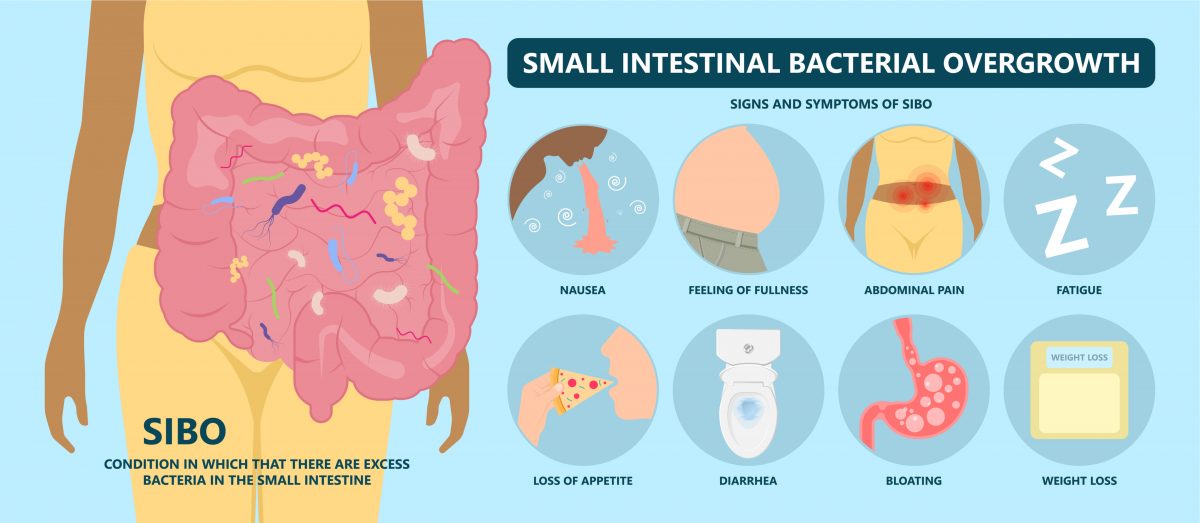The Low Fermentation Diet for SIBO
- SIBO
The Cedars Sinai Diet, also know as The Low Fermentation Diet, was originally developed by Dr Mark Pimentel of Cedars Sinai Hospital in LA.
The diet used to manage symptoms of small intestinal bacterial overgrowth (SIBO).
In this article I am going to outline the low fermentation diet and how it works to reduce SIBO symptoms. I am also going to give you my opinion and explain what I advise clients with SIBO.

What is SIBO?
SIBO stands for small intestinal bacterial overgrowth and occurs when an individual has a higher than normal level of bacteria living in the small intestine.
You can find out more about SIBO in my other article here.
What is the low fermentation diet?
The low fermentation diet has been designed to reduce symptoms of SIBO through changes in meal timings and avoidance of fermentable foods.
Foods which are low in fermentable carbohydrates are easy for our gut to digest and do not create excess gas. In contrast, when we eat ‘fermentable carbohydrates,’ bacteria breaks them down in a process known as fermentation, producing excess gas.
Below are some examples of foods allowed and should be avoided on the diet (1).
Foods allowed on the low fermentation diet
- Sweet potato
- Rice
- Regular potatoes
- Healthy fats
- Animal proteins
- Most fruits
- Some vegetables
- Protein powders (including vegan proteins)
Foods not allowed on the low fermentation diet;
- Beans and pulses
- Oats
- Some dairy
- Gums
- High FODMAP sweeteners
- Fiber supplements
Meal Patterns on the low fermentation diet
On the diet, it is advised that you at least a 4 hour gap between each time you eat and that you should not eat close to bedtime (1).
This is because the gut has a ‘cleaning process’ called the migrating motor complex or MMC.
This is a type of nervous system reaction that sweeps your gut every so often to clean it out, but it does not work if you are eating.
You can read more about the MMC in my article on fasting and gut health.
In theory, if you are a snacker and eat every hour of the day, this process does not work and could lead to or worsen bacterial overgrowth.
The MMC is said to more active at night, hence the no eating before bed time rule.
The research on the low-fermentation diet
There is no research on this specific diet protocol yet, but the diet elements are theories based on other areas of similar research.
The Dietitian Verdict
Some of the principles around the diet, such as avoiding fermentable carbohydrates and snacking, are likely beneficial to those trying to manage SIBO symptoms.
We know from studies in IBS that an intake of fermentable carbohydrates increases hydrogen gas production in the gut (2).
The 4-hour gap between eating could also be beneficial to allow the gut to ‘clear’ itself. BUT I wouldn’t be so strict with this as the time we fast overnight could be adequate alone for this function, we just don’t know yet.
So, if someone was struggling with this element, it would not be my primary focus. BUT, if you are able to have 4 hours gaps between your meals without causing any real problems then why not try it would be my advice.
The concerns I would have with this is diet are the following;
- There is no research to suggest this protocol is useful in SIBO.
- There is no specific time suggested for the diet. When we know that SIBO can be caused by poor gut health it would be detrimental to suggest that someone should avoid fermentable carbohydrates (which are also prebiotic foods) for long-periods of time.
- Some of the ‘allowed foods’ contain high levels of fermentable carbohydrates such as vegan protein powders, sweet potato and mushrooms.
- It is a very restrictive diet and could cause nutritional deficiencies longer-term.
- It doesn’t address bowel function or gut health which are both issues that can cause SIBO.
Overall, this diet does have some good elements to it but I would advise anyone reading this that they only do this diet alongside a dietitian to prevent damage to their gut health.
Summary
The low fermentation diet is often recommended to manage SIBO symptoms but has not been researched before.
The diet is also restrictive and information appears to be contradictory at times which may leave you confused and at risk of nutritional deficiencies.
I recommend that if you are diagnosed with SIBO that you should work with a GI doctor and dietitian team to have a more tailored approach for your symptoms.
This tailored approach would look at reducing your SIBO symptoms and improving your gut health to help avoid repeated SIBO issues.